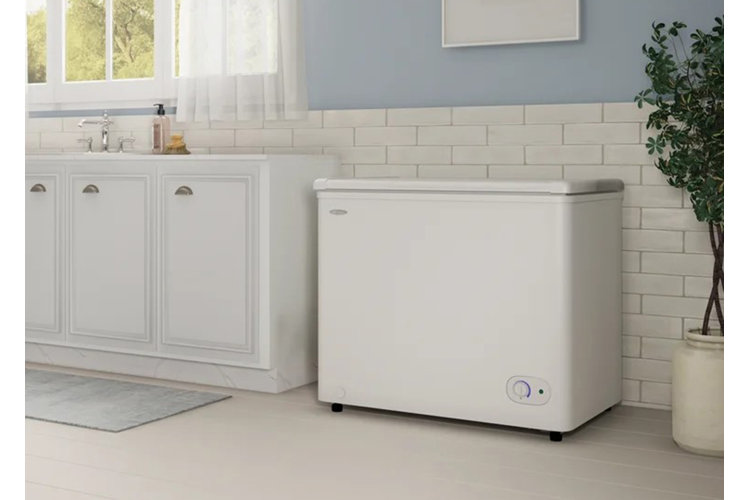Considerations for Outdoor Freezers
Environmental Impact on Performance
Placing a freezer outside, even tucked away in a shed, can lead to hiccups thanks to unpredictable Mother Nature. Extreme temperatures can really mess with your freezer’s mojo. According to folks chattering on the MoneySavingExpert Forum, fluctuating mercury levels are a common thorn in the side.
Some freezers are built tough for outdoor life, but picking the right trooper for your weather remains a big thing. Even the hardiest freezer can hit a snag when faced with bone-chilling conditions, potentially leading to a grumpy compressor or a frost-bitten unit, as Mr. Appliance mentions.
Temperature Fluctuations and Weather
Weather’s sense of humor can wreak havoc on an outdoor freezer. If Jack Frost is visiting, compressors can start acting up, risking inefficient cooling and spoiled snacks (Fridge.com).
To keep the weather from getting the last laugh, consider doing these:
- Insulation and Shelter: Make sure your freezer has its own cozy corner, safe from the wild whims of weather.
- Temperature Monitoring: Keep an eye on the freezing frontier. Regular check-ups help ensure everything stays on track.
- Heater Kit Installation: If the cold’s cranking it up, install a heater kit to give your compressor a helping hand.
- Routine Maintenance: Keeps things running smooth and ward off unwanted breakdowns.
For more cool hacks on keeping your freezer in top shape, check out our write-up on preventing moisture in freezers.
| Weather Conditions | Impact on Freezer Performance | Suggested Fixes |
|---|---|---|
| Extreme Cold | Compressor acting up, annoying ice build-up | Get a heater kit, insulate it like a pro |
| Temperature Swings | Cooling issues, food betrayal | Keep tabs on temps, do a regular check-up |
Knowing how weather throws shade on your outdoor freezer is key for keeping it in line and your grub safe. With a few smart moves and the right choice, you can dodge big headaches. Take a peek at our guide on multiple electrical outlets not working what to check to smooth out your appliance landscape.
Placing an Upright Freezer Outside
Sticking an upright freezer in a shed or outbuilding involves more than just plopping it down and plugging it in. You want it to run well and last, right?
Location and Electrical Needs
Giving your freezer a good home is essential. The shed must be steady and dry, shielding the appliance from direct sun and rain because, trust me, they’re not freezer-friendly. Ensure you have a steady babysitter in the form of power – freezers are picky with electricity.
- Electrical Setup: Check if your shed’s got a ready-outlet that’s friends with your freezer’s power appetite. Problems? Peek at multiple electrical outlets not working what to check or outdoor power outlet is not working.
Ventilation and Maintenance Tips
Your freezer loves fresh air – without it, it might overheat or just not do its job. Giving it some breathing room keeps things cool inside and lets it live longer, happy life.
- Spacing: Leave 2-3 inches space around the sides and back.
- Airflow: Pop in a fan if things get toasty; warm climates call for this TLC.
- Regular Check-Ups: Dust can be a sneaky freezer killer. Check and clean vents and coils. Odd sounds? Could be worth peeking at noisy freezer dangerous.
Precautions for Winter Use
Freezing weather can mess with your outdoor freezer. If it gets too chilly, that compressor might have a mind of its own, causing temps to go all over the place. Say goodbye to perfectly preserved leftovers! (Fridge.com). Here’s how to keep it together:
- Insulation and Shelter: Wrap it up cozy with insulation and give it a snug shed.
- Keeping Tabs: Regularly eyeball the temperature inside; don’t let it get lazy.
- Heater Kit: A heater kit might just save the day if the cold tries to crash your freezer party (Fridge.com).
- Regular Check-Ups: Double down on check-ups in winter to dodge nasty surprises.
Keeping these checkboxes ticked means your outdoor freezer will play nice. Maybe even look into prevent moisture in freezer for more tips on keeping it tip-top.
Placing a Chest Freezer Outside
Before you stick a chest freezer in your backyard or garage, there are a few things you gotta think about. You want to make sure that beauty runs like a dream and sticks around for a long time, even with the great outdoors trying to throw it off its game.
Performance and Lifespan Considerations
Chest freezers usually have better insulation than the stand-up ones; they’re like the puffers of the freezer world—ideal if you’re giving them some outdoor air. But don’t be fooled; outside stuff like rain, heat waves, or humidity can still give your freezer a run for its money. Humidity can mess with the works, heat can put the squeeze on its parts, and rain? Well, it doesn’t play nice with electricity if you get my drift (Fridge.com).
See the quick rundown below:
| Factor | What It Does to Performance | What It Does to Lifespan |
|---|---|---|
| Humidity | Might cause drips and rust | Could cut down life due to rust |
| Temperature changes | Can make the compressor work overtime | Causes slow wear and tear |
| Rain | Water might mess up electrics | Premature short-circuiting nightmare |
Wanna keep water out? Check out our tips (prevent moisture in a freezer).
Temperature Range and Ideal Conditions
To keep your freezer at its best, place it where it’s comfy—not too hot, not too cold. Too much of either can throw it off its stride.
-
Ideal Temps:
-
Keep the chill where it feels at home: between 0°F (-18°C) and 110°F (43°C) (Quora).
-
Running Smooth:
-
Keep it cool-ish and your freezer won’t sweat. It’ll chug along, keeping your burgers and ice cream just right, without gobbling up too much electricity.
| Temp Range | What It Means for Your Freezer |
|---|---|
| 0°F (-18°C) to 110°F (43°C) | Hummin’ and saving energy |
| Under 0°F (-18°C) | Innards might freeze and you got problems |
| Over 110°F (43°C) | Expect it to guzzle more juice and maybe fizzle out |
To protect your freezer baby from harsh weather, think about slap-on some extra layer like insulation, or humidity fighters. Peek at our article about insulating for outdoor bliss.
Keep these tips in your back pocket, and your chest freezer will lead a long and happy life outside. Plus, if things get wobbly, have a look at our freezer not freezing or even our handy device troubleshooting guides.
Deep Freezer Placement
Got no room inside for your deep freezer? Plunking it outdoors could work! Just remember to think about a few things to keep it ticking along nicely and safe.
Factors Messing with Performance
Pop your deep freezer outside, and you’re gonna deal with Mother Nature. Here’s what could throw a spanner in the works:
-
Crazy Temperatures: When it’s blazing hot or freezing cold, your freezer’s sweating to keep up. Hot weather can turn your power bill into a spiky little monster as it works overtime. For more insight, check out Fridge.com.
-
Humidity Blues: It’s not just about feeling sticky; humidity loves to chew up metal. Keeping your freezer dry is not just smart—it’s super smart. Need more tips? Here’s how to keep moisture at bay.
-
Moisture Mayhem: Rain and snow are not your freezer’s BFFs. Shelter that bad boy to keep its electric heart safe.
| Mother Nature’s Quirks | What Could Go Wrong |
|---|---|
| Crazy Temperatures | Overworked parts, epic electric bills |
| Humidity Blues | Rust and corrosion attack |
| Moisture Mayhem | Zaps to your electrical bits |
Security and Maintenance Concerns
Even a fortress like a deep freezer has its weak spots. Let’s keep it safe and sound:
-
Street-Smart Security: Freezers are prime targets for Mr. Sticky Fingers. Keep ’em safe by:
-
Stashing in a well-lit, hidden corner.
-
Slapping on locks or setting up cameras.
-
Sealing tight so critters don’t throw a freezerside buffet. For more on this, head to Fridge.com.
-
Zapping Risk: Make sure you’ve got a solid power setup, with weatherproof outlets and GFCI ready. Leave the extension cords in their boxes, they’re not cut out for rough weather. More info at Fridge.com. Running into trouble? Here’s what to tackle next.
-
Maintenance Must-Do’s: With nature taking its toll, a bit of TLC goes a long way. Give it the once-over regularly for rust or dodgy seals and keep it spick and span.
If you’re running out of room indoors but still want some control, placing the freezer in a separate storage shed could be your golden ticket. This way, you get outdoor perks with a sprinkle of protection. For more troubleshooting tips, you might wanna see our guide on what to do when multiple outlets aren’t clicking on.
Freezer Location Alternatives
Insulation for Outside Placement
Thinking about sticking a freezer in your shed? Well, you better think about insulation too. Mother Nature likes to throw curveballs, and an unprotected freezer’s performance can go haywire with temperature swings. No one wants their ice cream melting today and freezing like a brick tomorrow.
Keeping a balanced temperature inside your freezer stops it from needing to work extra hard, meaning it might not die on you anytime soon. Here’s some no-nonsense advice:
- Types of Insulation: You’ve got choices like foam boards, reflective sheets, or good old fiberglass.
- Tips for Installation: Seal those gaps around doors and windows tight. Insulate the shed’s walls, floor, and ceiling to fight off the outside world’s temperature tantrums.
- Extra Perks: Insulation helps with keeping things the right temperature and fights off humidity nasties.
| Insulation Type | Effectiveness | Cost |
|---|---|---|
| Foam Board | High | $ |
| Reflective | Moderate | $ |
| Fiberglass | High | $$ |
Need more freezer wisdom? Check out our piece on keeping moisture out here.
Humidity Control in Storage Spaces
Worried about humidity? It’s the bad guy when you’ve got a freezer in the shed. Too much moisture leads to frost, mold, and a freezer working overtime. You don’t want your freezer taking early retirement over this.
Here’s how to keep that shed dry:
- Dehumidifiers: A trusty way to suck out extra moisture from the air.
- Ventilation: Let your shed breathe with vents or a fan to stop moisture from settling.
- Silica Gel Packets: Lay these packets around to soak up stray humidity.
- Weather Stripping: Line the doors and windows to block outside moisture.
| Method | Effectiveness | Cost |
|---|---|---|
| Dehumidifiers | High | $$ |
| Ventilation | Moderate | $ |
| Silica Gel Packets | Low | $ |
| Weather Stripping | Moderate | $ |
Keeping these things in mind can save your freezer from a world of hurt when it’s sitting in a shed. For more handy advice, peek at our guides on noisy freezers and that annoying fridge knocking here.

